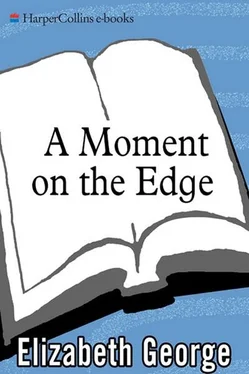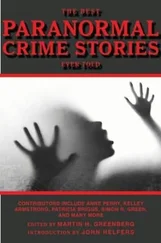A Moment on the Edge
100 YEARS OF CRIME STORIES BY WOMEN
Edited by Elizabeth George
CONTENTS
INTRODUCTION: ELIZABETH GEORGE
v
A Jury of Her Peers SUSAN GLASPELL
1
The Man Who Knew How DOROTHY L. SAYERS
27
I Can Find My Way Out NGAIO MARSH
45
The Summer People SHIRLEY JACKSON
75
St. Patrick’s Day in the Morning CHARLOTTE ARMSTRONG
93
The Purple Is Everything DOROTHY SALISBURY DAVIS
119
Money to Burn MARGERY ALLINGHAM
133
A Nice Place to Stay NEDRA TYRE
147
Clever and Quick CHRISTIANNA BRAND
161
Country Lovers NADINE GORDIMER
177
The Irony of Hate RUTH RENDELL
189
Sweet Baby Jenny JOYCE HARRINGTON
207
Wild Mustard MARCIA MULLER
229
Jemima Shore at the Sunny Grave ANTONIA FRASER
241
The Case of the Pietro Andromache SARA PARETSKY
279
Afraid All the Time NANCY PICKARD
309
The Young Shall See Visions, and the Old Dream Dreams
KRISTINE KATHRYN RUSCH
327
A Predatory Woman SHARYN McCRUMB
349
Jack Be Quick BARBARA PAUL
363
Ghost Station CAROLYN WHEAT
399
New Moon and Rattlesnakes WENDY HORNSBY
417
Death of a Snowbird J. A. JANCE
437
The River Mouth LIA MATERA
459
A Scandal in Winter GILLIAN LINSCOTT
475
Murder-Two JOYCE CAROL OATES
505
English Autumn — American Fall MINETTE WALTERS
533
ACKNOWLEDGMENTS
ABOUT THE EDITOR
OTHER BOOKS BY ELIZABETH GEORGE
PRAISE
CREDITS
COVER
COPYRIGHT
ABOUT THE PUBLISHER
INTRODUCTION
by Elizabeth George
Whether the story is a murder mystery, a tale of suspense, a psychological study of the characters affected by a devastating event, the retelling of a famous criminal act, a courtroom drama, an exposé, a police procedural, or a truthful account of an actual offense, the question remains the same. Why crime? Whether the characters involved are FBI agents, policemen and women, forensic scientists, journalists, military personnel, the man or woman on the street, private detectives, or the little old lady who lives next door, the question remains the same. Why crime? Be it murder (singular, serial, or mass), mayhem, robbery, assault, kidnapping, burglary, extortion, or blackmail, we still want to know: why crime? Why exists this fascination with crime and why, above all, exists this fascination with crime on the part of female writers?
I think there are several answers to these questions.
Crime writing is practically as old as writing itself and is consequently very much part of our literary tradition. The earliest crime stories come to us from the Bible: in a jealous rage, Cain kills Abel; in a jealous conspiracy, Joseph’s brothers sell him into slavery in Egypt and fake his death for their devastated father; in lustful jealousy, David sends Bathsheba’s husband to the front lines in battle so that he might have the winsome woman for himself; in unrequited lust, two respected elders bear false witness against the virtuous Susanna, condemning her to death for adultery unless someone can come forward and disprove their story; fathers lie with their daughters in criminal acts of incest; brothers kill, fight with, lie about, and otherwise abuse their brothers; women demand the heads of men on platters; Judith decapitates Holofernes; Judas betrays Jesus of Nazareth; King Herod slays the newborn male children of the Hebrews…It’s a nasty place in the Old and New Testament, and we feed off this place from our earliest years.
Crime is mankind on the edge, in extremis , but more than that, crime is mankind stepping outside of the norm. For every Cain, there are a billion brothers who have co-existed throughout the centuries. For every David, there are ten million men who’ve turned away from a woman they want when they learn she is committed to another. But this is what makes crime so interesting. It isn’t what people normally do.
It would be nice to believe that cars slow down on the freeway when there is an accident because of the drivers’ heightened sense of caution: everyone sees the flashing lights up ahead, the smoke, the flares, the ambulances, the fire trucks, and hits the brakes so as not to end up in the same condition as the unfortunates currently being extricated from mangled metal. But this is not generally why people slow down. They slow down to gawk, their curiosity piqued.
Why? Because an accident on the freeway is an anomaly, and anomalies interest us. They always interest us: have done from the beginning of time and will do till the end of it.
Brutal murders garner front-page space. Kidnappings, disappearances, riots, fatal auto accidents, plane crashes, terrorist bombings, armed robbery, snipers firing on the unsuspecting…all of this cuts into everyday life, awakening us to the fragility of our individual existences as it simultaneously whets our appetite to know . We grind to a halt as a nation to listen to the verdict in the O. J. Simpson case because there are base passions involved in whatever happened on Bundy Drive, and the base passions of that double killer awaken the base passions within ourselves. Blood spilled cries out for more blood to spill in retribution for the act. We seek a punishment to fit each crime. Crime is as old as humanity. But so is sensation. So is vengeance.
Crime literature gives us a satisfaction that we are often denied in life. In life, we never do know who really killed Nicole and Ron; we only suspect there was a second gunman on the grassy knoll; we are left to wonder about Dr. Shepherd’s wife and Jeffrey MacDonald’s capacity for truth or self-delusion. The Green River killer disappears into the primordial slime from which he rose, the Zodiac killer joins him there, and we are left with only the questions themselves: who were these people and why did they murder? But in crime fiction, the killers face justice. It can be real justice, poetic justice, or psychological justice. But face it they do. They are un-masked and normalcy is restored. There is vast satisfaction for the reader in that, certainly more satisfaction than is garnered from the investigation into and punishment for an actual crime.
For the writer who wishes to explore characters, there is nothing so catastrophically catalytic as the intrusion of a crime into an otherwise peaceful landscape. A crime places everyone into a crucible: the investigators, the perpetrator, the victims, and those in relationship to the investigators, the perpetrator, and the victims. Within this crucible of life’s most monstrous acts the mettle of the characters is tested. It is when characters confront the most serious challenges to their beliefs, their peace, their sanity, and their way of life that their pathology is triggered. And it is the pathology of the individual character clashing with the pathology of all the other characters that is the stuff of drama and catharsis.
Some of our most enduring pieces of literature have a heinous crime as their backdrop. Hamlet’s monumental mental struggle to overcome his conscience and act the part of Nemesis could not occur had the poisoning of his father not happened in a brutal act of frat-ricide. Oedipus could not fulfill his destiny without first killing King Laius on the road to Thebes. Medea would not be in the position in which she is placed in Corinth — an outcast about to be cast out by a nervous Creon all too aware of her abilities as a sorceress — had her reputation as the mastermind behind King Pelias’s death not preceded her. So it should come as no surprise to anyone who reads that crimes continue not only to fascinate writers but also to serve as the backbone for much of their prose.
Читать дальше












